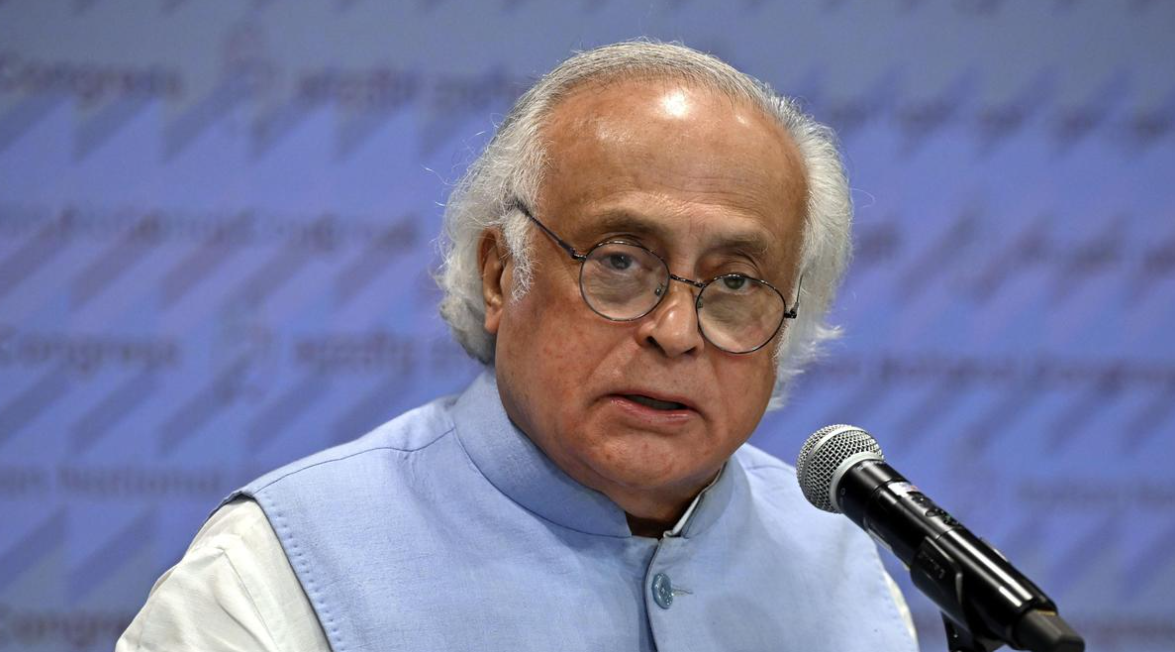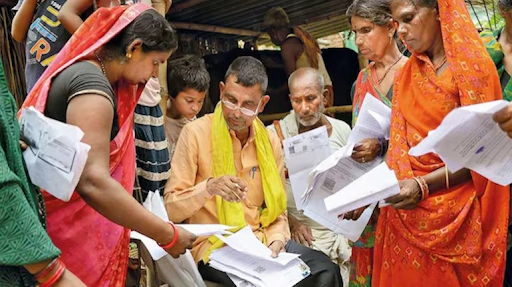Copyright infringement not intended
Picture Courtesy: The Hindu
Context:
The recent deletion of nearly 27 lakh workers from the MGNREGS database, has sparked widespread criticism. The surge in deletions coincides with the government's rollout of mandatory electronic KYC (e-KYC) verification for all active workers under the scheme, a process the government says aims to remove ineligible beneficiaries.
What is Mahatma Gandhi National Rural Employment Guarantee Scheme (MGNREGS)?
The Mahatma Gandhi National Rural Employment Guarantee Scheme (MGNREGS) is a flagship social security program in India that guarantees at least 100 days of wage employment in a financial year to every rural household whose adult members volunteer to do unskilled manual work. The scheme aims to enhance livelihood security, create durable assets, empower women (with a minimum of one-third beneficiaries), and strengthen local governance through Panchayats.
What are the objectives of MGNREGS?
he primary objective of the Mahatma Gandhi National Rural Employment Guarantee Scheme (MGNREGS) is to enhance the livelihood security of rural households by guaranteeing at least 100 days of wage employment in a financial year to every household whose adult members volunteer to do unskilled manual work. This scheme aims to provide social protection for vulnerable rural populations by creating productive assets, improving water security, soil conservation, and land productivity. Additional objectives include drought-proofing and flood management, empowering marginalized groups such as women, Scheduled Castes, and Scheduled Tribes through rights-based legislation, and strengthening decentralized participatory planning involving local governance institutions. The program is demand-driven, ensuring legal entitlement to work and wages, with mechanisms in place to provide compensation in case of delays or failure to provide employment. MGNREGS also promotes sustainable rural development through community involvement and convergence with other anti-poverty initiatives.
What are reasons for deletion of names from MGNREGS?
Permanent migration: If a household permanently relocates from the concerned Gram Panchayat, their job card and associated worker names can be deleted from the MGNREGA database.
Fake job cards: Job cards found to be duplicates or issued based on forged documents are subject to deletion to prevent fraud and misuse of scheme benefits.
Reclassification of area: When a Gram Panchayat is reclassified as a Municipal Corporation or urban area, job cards linked to that area may be deleted as the scheme is primarily rural-focused.
Not willing to work: Workers who voluntarily desist from participating in the scheme have their names deleted, though this reason has faced criticism for potentially undermining beneficiaries’ rights.
Aadhaar-Based verification (e-KYC): The mandatory linking of Aadhaar numbers to job cards and digital attendance and payment systems has led to deletions of workers without valid Aadhaar linkage or with discrepancies in data.
Administrative verification and compliance:Deletions follow a prescribed process involving independent verification and documentation, with reports shared to Gram Sabhas or Ward Sabhas to maintain transparency.
What are the issues in MGNREGS?
- Delay in payment of wages: One of the major issues in MGNREGA implementation is the delayed wage payments to workers. Most states have failed to disburse wages within the mandated 15 days, causing financial hardships for rural workers. For instance, studies show significant delays in wage payments, with certain states unable to compensate workers on time, leading to loss of trust and morale among beneficiaries.
- Administrative challenges: MGNREGA suffers from complicated administrative structures with insufficient trained personnel at Panchayat and block levels. A case study from Maharashtra revealed poor planning, inadequate staff competence, and lack of clear site identification impacting scheme efficiency. These systemic issues contribute to delayed and poor implementation of projects.
- Corruption and inequity: Corruption and irregularities at local levels affect the equitable distribution of benefits. In some areas, powerful groups monopolize job cards, while women and marginalized communities face discrimination and limited access. The Comptroller and Auditor General (CAG) reports and various field studies have highlighted these biases reducing the scheme’s effectiveness.
- Incomplete and low-quality works: The quality and completion rate of assets created under MGNREGA have been a concern. Inspections indicate numerous projects remain incomplete or are poorly executed without contributing to sustainable development goals. This undermines the credibility and long-term benefits of the scheme.
- Awareness and social mobilization: Lack of adequate awareness about the scheme’s provisions is widespread, preventing eligible beneficiaries from fully utilizing their rights. Social audits and awareness campaigns have shown mixed results; states with active local engagement, such as Rajasthan, have reported better implementation, while others lag due to limited community involvement.
- Funding and budget constraints: Inadequate and untimely funding pose major constraints in executing planned work and paying workers promptly. Some reports state that budget allocations have not always matched the scheme’s demand, hampering the fulfillment of guaranteed employment.
Mihir Shah committee recommendations on MGNREGA:
The Mihir Shah Committee proposed comprehensive reforms aimed at enhancing the effectiveness of MGNREGA. Key recommendations include:
- Expansion of Permissible Works: The committee suggested broadening the list of permissible works to include activities linked to agriculture, livestock, fisheries, rural drinking water, sanitation, and ecological balance. This includes new works such as System of Rice Intensification (SRI), soil conservation, manure production, seed storage, and coastal protection measures.
- Strengthening the Demand-Driven Nature: It emphasized maintaining the demand-driven aspect by mandating continuous acceptance of work applications by Gram Panchayats or Programme Officers, and issued that refusal or delay in accepting applications should be a violation under Section 25 of the Act.
- Reducing Payment Delays: The report recommended strict timelines, stating all payments, including interim ones, should be made within 15 days to reduce delays, with delays deemed punishable offenses.
- Integrated Fund Management: Introduction of an Electronic Fund Management System (eFMS) pooling funds at the state level was proposed to address fund shortages at district or block levels, allowing timely wage payments.
- Labour Budgeting and Planning: The committee recommended the preparation of labour budgets that assess demand and the timing of work, along with a shelf of projects to align employment opportunity with seasonal migration patterns, aiming to prevent distress migration.
- Advancing Annual Plans: It suggested shifting the presentation of annual plans from October 2 to August 15 to enable timely work planning and execution before migration periods.
- Citizen’s Charter and Grievance Redressal: The guidelines proposed drafting a citizen’s charter detailing duties and service levels for Panchayats and officials under MGNREGA. States were urged to establish Ombudsman offices at district levels for timely grievance resolution.
- Strengthening Social Audits and Civil Society Role: The committee underscored the need for enhanced vigilance, social audits, and active participation by civil society to improve transparency and reduce corruption.
What are the government measures to strengthen MGNREGS?
- 2025 Amendment Mandating Water Conservation Projects: The Centre amended Schedule-I of the MGNREGA Act to mandate minimum block-level spending on water conservation and harvesting projects, addressing India's groundwater crisis. Depending on local hydrological conditions, 30% to 65% of funds must be allocated to water-related works, such as rainwater harvesting, check dams, and watershed management. This aligns rural employment with ecological goals, transforming MGNREGS into a preventive tool for water security and climate resilience.
- Record Budget Allocation: The government retained a historic budget allocation of ₹86,000 crore for FY 2025-26, the highest ever since the scheme's inception. Over half of this was disbursed in the first quarter, showing financial commitment to rural employment and poverty alleviation.
- Integration with Technology: The scheme has advanced its digital infrastructure by linking over 97% of active workers with Aadhaar Payment Bridge systems to ensure direct wage payments, along with initiatives like geotagging of assets and real-time attendance monitoring through National Mobile Monitoring Software (NMMS). These efforts improve transparency and accountability.
- Good Governance Reforms: Job card verification, simplified registers, stronger social and internal audits, proactive inclusion of landless labourers, and deployment of citizen information boards have been implemented to enhance governance and reduce corruption.
- Skill Development Initiatives:The government launched “Project UNNATI” to upgrade the skills of MGNREGS workers, assisting their transition to full-time employment or self-employment, thereby enhancing livelihood opportunities beyond manual wage work.
- Convergence with Other Ministries: MGNREGS works are coordinated with other government departments to support infrastructure development including Anganwadi centres, GP buildings, and border road connectivity, creating multifaceted rural benefits.
- Focus on Agriculture and Allied Activities:About 44% of expenditure till March 2025 was spent on agriculture and allied activities, emphasizing the scheme’s role in strengthening rural economies.
Conclusion:
MGNREGA is a landmark rural employment guarantee scheme providing a legal right to at least 100 days of unskilled manual work annually to rural households. It aims to enhance livelihood security, promote inclusive development, and create durable rural assets while empowering marginalized communities. Despite challenges like delayed wages and administrative issues, government reforms such as mandating water conservation works, skill development programs, digital payments, and policy oversight committees have strengthened implementation. Continuous efforts are needed to ensure timely payments, reduce exclusions, and promote convergence for sustainable rural development under MGNREGA.
Source: The Hindu
|
Practice Question
Q. Critically analyse the key objectives and challenges of the Mahatma Gandhi National Rural Employment Guarantee Act (MGNREGA). Substantiate your answer with relevant case studies, government measures, and committee recommendations to suggest how the scheme can be strengthened for enhanced rural livelihood security and sustainable development. (250 words)
|
Frequently Asked Questions (FAQs)
MGNREGA guarantees at least 100 days of wage employment in a financial year to every rural household willing to do unskilled manual labour.
All adult members of rural households who are willing to work under the scheme can register and obtain a job card.
The scheme allows unskilled manual work such as water conservation, land development, rural infrastructure improvement, afforestation, and other public works focused on natural resource management.







